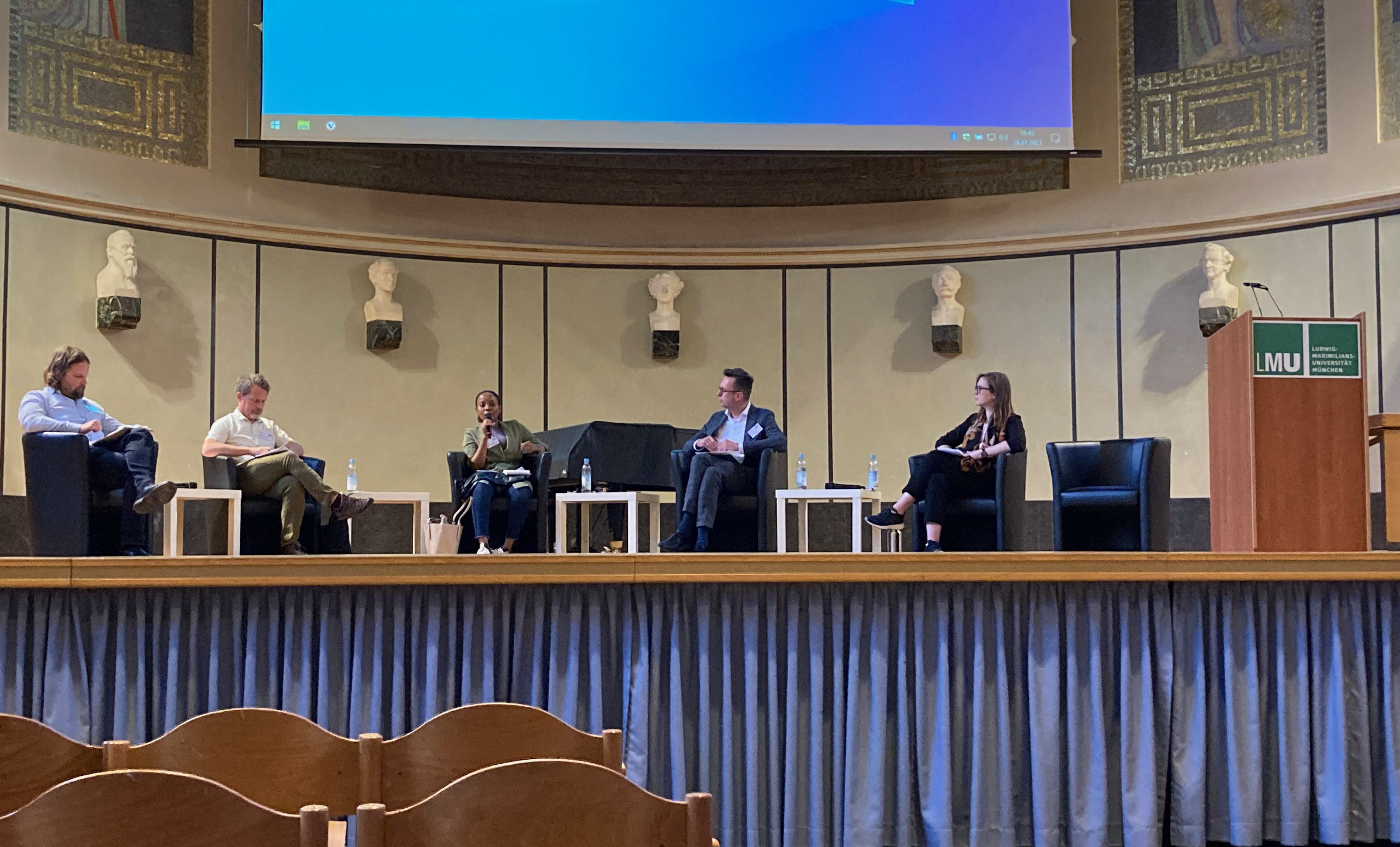26 Sep 2023 | Diana Gabler
Plenary review: "Contested Knowledge: Museological Perspectives"
At the center of the museum plenary "Contested Knowledge: Museological Perspectives" at the 2023 meeting of the German Anthropological Association (Deutsche Gesellschaft für Sozial- und Kulturanthropologie, DGSKA) were three 20-minute contributions by Joshua Bell (Smithsonian National Museum of Natural History, U.S.), Flower Manase (National Museum of Tanzania), and Jacek Kołtan (European Solidarity Centre, Poland), who presented different approaches to reconceptualizing museums.
In light of the increasing significance of historical collections and the ongoing academic shifts, including the material and ontological turns, the panel centered its discussion on decolonial knowledge practices. It explored how the transformation and revitalization of museums through interdisciplinary and Indigenous approaches can actively foster collaborative and participatory knowledge practices.
 Left to right: Philipp Schorch (panel convener), Joshua Bell, Flower Manase, Jacek Kołtan and Diana Gabler (panel convener). Photo: Katharina Nowak.
Left to right: Philipp Schorch (panel convener), Joshua Bell, Flower Manase, Jacek Kołtan and Diana Gabler (panel convener). Photo: Katharina Nowak.
Joshua Bell, cultural anthropologist at the Smithsonian Institution's National Museum of Natural History (NMNH) in Washington, D.C., approached the panel's theme and questions on historical developments, social conditions, and power dynamics by introducing NMNH’s current interdisciplinary exhibit Cellphone: Unseen Connections. He explored how the exhibition on global and local connections through cellphones uses personal perspectives to decode the complex supply chain of cell phones. Within the exhibit, a graphic novel is utilized as an educational tool to promote responsible cellphone use. Bell addressed the cultural and environmental divide in the context of technology and globalization and discussed the importance of recognizing and navigating various relationships. Additionally, he reflected on the legacy of colonial collections and the broader role of museums in contemporary society.
Flower Manase, senior curator at the National Museum of Tanzania and doctoral candidate at the Humboldt University Berlin, laid out the critical question: "Do we need community museums or museum and communities?” By exploring the multi-layered concept of community through the Maji Maji Memorial Museum under the umbrella of the National Museum of Tanzania, she emphasized its history, operations, and ownership. The Maji Maji Memorial Museum was established by Ngoni communities to commemorate the ancestors who were killed during the Maji Maji anti-colonial resistance (1905-1907). The museum serves as a community museum, focusing on colonial memories and annual commemorations. Manase highlighted the importance of community engagement in programming to address social issues and raised questions about inclusivity, the role of exhibitions, storytelling, and incorporating the voices of diverse communities. She ultimately assessed the role of the national museum in fostering community museums within the framework of 'museum and communities,' considering its colonial heritage.
Jacek Kołtan, philosopher, political scientist, and director's representative for research at the European Solidarity Centre in Gdańsk, discussed how museums in Poland have adopted a narrative approach to address cultural and political identity deficits, aiming to embed Central and Eastern European history within a broader context. He argues that this narrative shift challenges the traditional colonial model and emphasizes the region's uniqueness, often overlooked in Western European narratives. He talked about how the Polish perspective on museums underscores that they are not colonial institutions, as Poland's history was marked by the loss of state institutions and cultural heritage due to external forces, such as World War II. Notably, Polish museums have become spaces of political conflict amid the dismantling of liberal democracy, highlighting their contemporary significance.
Through the diverse lenses of three distinct case studies, it became evident that community-based initiatives are at the very heart of modern museum practices. These initiatives manifest in various forms, such as fostering collaboration and inclusivity by engaging external partners in exhibitions, redefining an institution's narratives, or catalyzing profound organizational transformations through community ownership.
The museum plenary "Contested Knowledge: Museological Perspectives" took place on 26 July 2023 as part of the conference of the German Anthropological Association (DGSKA) on Contested Knowledge: Anthropological Perspectives which was hosted by LMU Munich.

